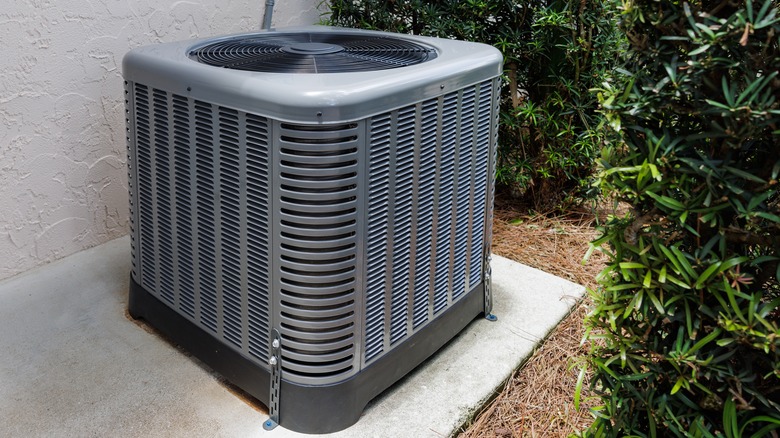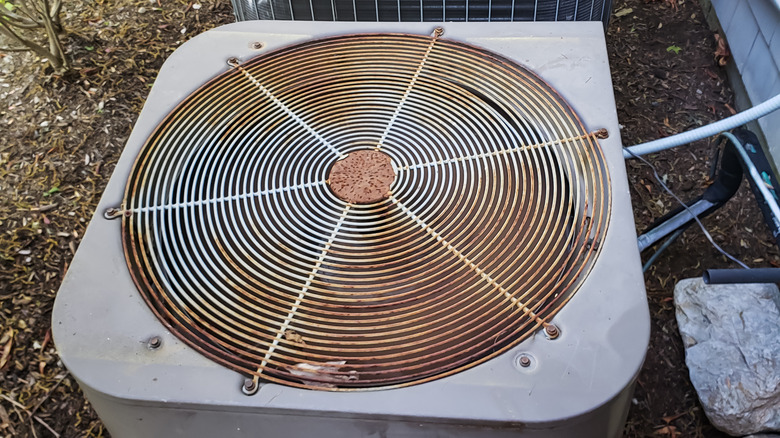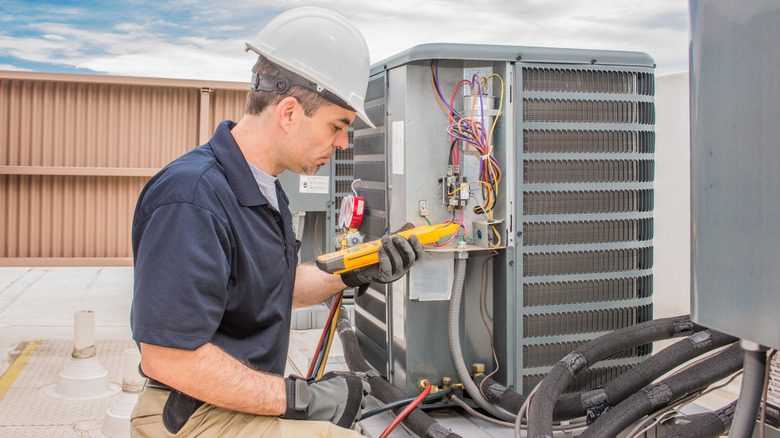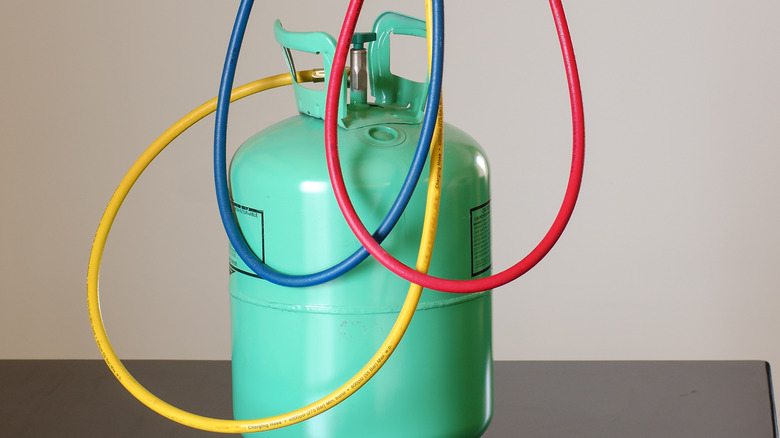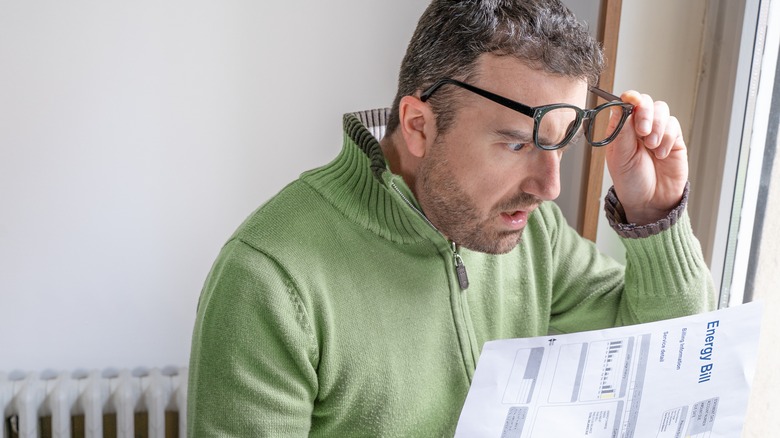An Expert Explains When It's Time To Change Your HVAC System - Exclusive
If you were to think of your residence as a living and breathing entity then your home's HVAC system would act much like the lungs and serve as one of the most vital parts of your house. Much like the importance of good pipes and electrical work, having a well-maintained and quality HVAC system can improve the living conditions within your house and even save you some money. Your home's HVAC system consists of heating, ventilation, and air conditioning that can generally come from a main forced air unit, according to Arpi's Industries Ltd. This system is able to push hot, cold, and forced air throughout your home so you can stay cozy in the winter and cool in the summer, as well as circulate purified air which can help remove harmful allergens from your interior.
To get the best performance out of your unit, it helps to properly care for it by regularly changing the filters, as well as cleaning your outdoor condenser every season with a hose to free it of dirt and debris. However, even with regular cleaning and care, there may come a time when you have to change your HVAC system. But, what are the signs it needs switching and when exactly should you do this? In an exclusive interview with House Digest, expert and owner of Choice Air Care, Chris Forbus, shares with us the inside scoop on when you should consider getting a new HVAC unit.
It's more than 10 to 15 years old
One sure sign that your HVAC system is due for some much-needed updating is if it has started to run past the prime years of its life. Just like any machine, there comes a time when it requires a serious upgrade. According to the U.S. Department of Energy, you might be in need of a new system if your HVAC unit is 15 years or older.
Although the frugal homeowner may try to extend the life of their heating and air conditioner units in an attempt to stave off the costs involved in making a new purchase, this could actually work against you in the long run. "A newer model will be more efficient and thus save on energy," Chris Forbus explains. "Even if it's still working fine, a new system may pay for itself during its lifespan, thanks to the savings in energy costs."
With advances in energy conservation technology constantly improving, it only makes sense to keep your home's units up to speed. This can ensure that your home is running in peak condition and efficiency. Also, if you're thinking of selling your residence, it can be more attractive to potential homebuyers if the unit is in new working condition as opposed to being on its last legs. There is even the possibility that replacing your equipment could result in a 10% increase in the value of your property, according to HVAC Boss.
It needs frequent repairs
If you find that you're calling your HVAC technician more often than you would like then it might be time to consider replacing it. "Even if it's less than 10 years old, if your system needs repair every year, the costs add up," explains Chris Forbus. When balancing the considerable costs involved with a technician making frequent visits as opposed to spending the money on a new product that won't need constant tinkering, it might be in your favor to spend the money on a new unit.
There could also be other factors that might explain why your system is acting up, too, per Forbus. "For example, if your house is a new build, it's very possible the builder used an inexpensive 'builders-grade' HVAC unit, which can easily have a shorter than average life span," he continued. This is where doing a little studying on the types of units available and checking the product reviews could help you make a more informed decision when purchasing future items or investing in a new home.
Forbus also mentioned other problems that could explain the additional care. "If your system was not properly maintained, especially with regular air filter changes, it could impact the life of the unit," he added. "And if the unit is undersized, it will be overworked and have a shorter life span. It's also possible you just got a lemon."
Your system uses R-22 refrigerant
Eliminating environmentally-harmful products that negatively affect the earth's atmosphere has been an important yet gradual process across the globe. As we learn of items that are not eco-friendly, it may take a while for them to disappear from consumer circulation, especially if the product is already in the household.
With regard your air conditioning, there is a certain ozone-harming gas that may be present in older units which should be replaced. Known as R-22, this particular hydrocarbon refrigerant was often blended with butane or propane and is very flammable, as well as harmful to the environment and those in your home, according to the United States Environmental Protection Agency. "Many systems before 2010 use R-22, which is no longer produced," Chris Forbus reveals. "This means that the cost will continue skyrocketing as supplies dry up. If you find your system in need of refrigerant in the middle of summer, you may wish you had replaced the system earlier."
As part of an ongoing effort to protect the environment, certain substances such as R-22 would be banned for use globally in compliance with the Montreal Protocol. If you suspect that your older HVAC system may still be using this gas — or you just want to play it safe — it would be worth your while to have it inspected by a licensed professional.
Your electricity bill is higher
An easy way to check to see if your HVAC system needs replacing is to track if its performance — or lack thereof — is affecting your total monthly electricity use. "Systems decline as they age," Chris Forbus tells us. "If your energy bills are much higher than they used to be, it may be a sign that your system needs updating."
However, Forbus cautioned that you need to dig deeper than just counting those extra dollars or cents. "Don't compare your total energy bill with the past, because electricity costs are higher now," he continued. "Compare the average KW/Hrs you use each month."
On average an American household will consume 10,715 kWh per year which boils down to around 893 kWh per month, according to the U.S Energy Information Administration. Obviously, this number fluctuates from state to state depending on your heating and cooling needs throughout the year. So if you notice that energy usage is reaching higher than normal numbers and you don't seem to be changing your daily habits, then it might just be that aging HVAC system working overtime.
Poor performance
Finally, the most blatant sign that your HVAC system is in need of a total overhaul is if it simply isn't doing what it's supposed to be doing. "This is similar to increased electric bills, but you may notice problems because your AC is constantly running," Chris Forbus shares. "Or, you may find that the humidity in your home is worse than it used to be." Whether it's an overactive air conditioning unit or a heating system that just isn't running up to speed, Forbus says that "Both are signs that something isn't right."
The last thing you want is to go into a hot summer season with no AC or be extra chilly on those cold winter nights. But before you start shopping for new units and drop a ton of money into a whole state-of-the-art system, Forbus has some advice. "At the least you should have your system checked by a professional," he recommends. A licensed HVAC technician can assess the units in your home and give you a professional opinion on whether your heating and air conditioning can be serviced or needs to be replaced.
